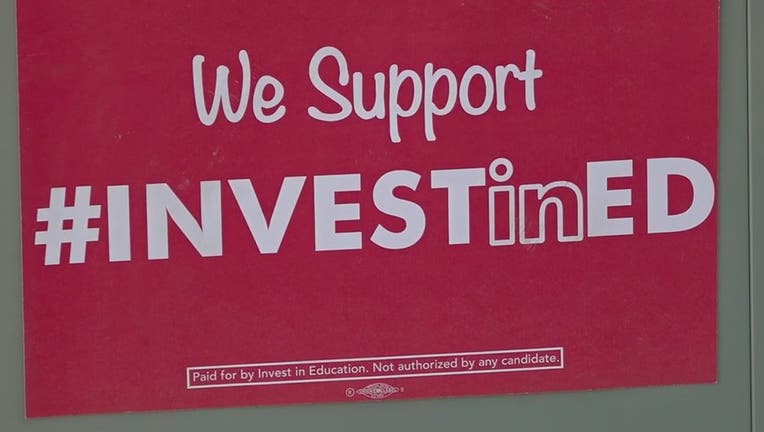Judge in Arizona throws education funding measure off November ballot

PHOENIX - A judge on Friday blocked an initiative that would have raised taxes on the wealthy in Arizona to help boost education funding, agreeing with opponents that the 100-word summary on petitions that more than 400,000 voters signed to qualify it for the November ballot was incomplete.
Maricopa County Superior Court Judge Christopher Coury also found that a bonus system the petition company used to award some circulators violated a law that bans paying them per signature. But he declined to remove all petitions gathered by the company, instead ruling some were invalid but not enough to block the measure.
The ruling is a huge blow to proponents of the Invest in Education Act, who saw it as a way to pump about $940 million a year into the state’s underfunded school system. The proposed initiative backed by many educators and the state teachers union would have imposed a 3.5% tax surcharge on income above $250,000 for an individual or above $500,000 for couples.
Measure proponents, opponents speak out
Jaime Molera, a former state superintendent of public instruction who led the opponents’ effort, hailed the ruling.
“As we made clear, the tax increase proponents’ entire process, from signature gathering to their 100-word summary, was flawed and misleading,” Molera said in a statement. “Perhaps most troubling, however, is that their proposed policy would have done tremendous harm to the Arizona economy and the state’s small businesses during a particularly challenging time.
“Should the proponents appeal the decision to the state Supreme Court, we anticipate the same outcome.”
Joe Thomas, president of the state teachers union and a major backer of the initiative, wasn’t immediately available to comment. But the Invest in Ed group tweeted that the judge put his “personal political views … into a process that is supposed to be impartial,” and vowed to appeal.
The backers can appeal directly to the state Supreme Court.
Coury wrote that backers failed to include five “principal provisions” in the summary, an omission that the state Supreme Court said in 2018 merits removing the measure. That ruling blocked an earlier effort by the same group to raise taxes on the wealthy to boost education funding.
The judge agreed with Molera’s group, which was backed by the Arizona Chamber of Commerce and Industry, that the summary was misleading because it didn’t clearly state how the money would have been distributed.
He also agreed that voters weren’t told that business income that is counted as individual income on tax returns will be affected by the new tax and that the initiative didn’t clearly spell out the impact on marginal tax rates, or that it blocked the Legislature from cutting other school funding to offset the new tax and overruled a limit on local revenues.
The fifth provision, backers’ calling the new tax a “surcharge” rather a tax, was part of the earlier Supreme Court ruling.
The judge said that ruling provided backers the “rare luxury” of an Arizona Supreme Court decision discussing how to phrase the proposed tax increase. Instead, they used the confusing term “surcharge” instead of “tax increase,” he wrote.
“The unfortunate victims in this case are Arizona’s teachers and students,” Coury wrote. “Defendant Invest in Education, quite simply, let Arizona’s teachers down for the second time since 2018.”
The judge said backers were required to write a transparent summary but instead “circulated an opaque ‘trojan horse’ of a 100-word description, concealing principal provisions of the Initiative. No matter how well-intentioned IIE’s Initiative was, its non-transparent description violates Arizona law.”
Proponents said half of the new tax would have been devoted to raises for credentialed teachers, 25% to boosting wages for cafeteria workers, bus drivers and other support staff, and the rest for teacher training, vocational education and other initiatives.
The leader of minority Democrats in the state House, Charlene Fernandez, said in a statement that there was no confusion and that voters knew exactly what they were signing.
“This judge held Invest in Ed to an impossible standard where a ballot measure must — in effect — use its opposition’s talking points and include minor aspects of the proposal that can’t possibly fit in 100 words,” Fernandez said. “Arizona schools and teachers have been disrespected for too long, and the Arizona Supreme Court should right this wrong as soon as possible.”
Coury oversaw three days of testimony that ended Thursday. Witnesses for a petition circulation company denied they paid collectors per signature, although they acknowledged paying bonuses partly tied to the number of petition sheets they collected. Lawyers for the opponents argued the bonuses ran afoul of a 2017 state law.
The initiative was the latest outgrowth from a teachers strike two years ago that highlighted low wages for educators and a slow rebound from budget cuts enacted during the Great Recession. The walkout secured higher wages for teachers, but many education interest groups said it fell short.
Three other initiatives that filed enough signatures to qualify for the ballot also face court challenges. Initiatives legalizing marijuana, forbidding surprise medical billing and overhauling the state’s criminal sentencing rules face similar challenges in upcoming court hearings.
The secretary of state is reviewing the petition sheets for all four initiatives and will send a sample to county recorders for verification before certifying that they have enough to make the ballot.

